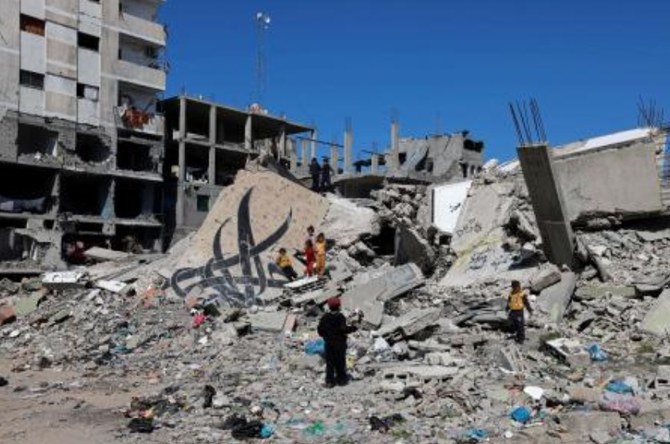
- ARAB NEWS
- 01 Jul 2025

GENEVA: Any transfer of weapons or ammunition to Israel that would be used in Gaza is likely to violate international humanitarian law and must cease immediately, UN experts warned on Friday.
“All states must ‘ensure respect’ for international humanitarian law by parties to an armed conflict, as required by 1949 Geneva Conventions and customary international law,” a media statement quoted the experts as saying.
“States must accordingly refrain from transferring any weapon or ammunition — or parts for them — if it is expected, given the facts or past patterns of behavior, that they would be used to violate international law.”
According to the experts, such transfers are prohibited even if the exporting state does not intend the arms to be used in violation of the law — or does not know with certainty that they would be used in such a way — as long as there is a clear risk.
Meanwhile, the UN experts welcomed the decision of a Dutch appeals court on Feb. 12 ordering the Netherlands to halt the export of F-35 fighter jet parts to Israel.
The court found that there was a “clear risk” that the parts would be used to commit or facilitate serious violations of international humanitarian law, as “there are many indications that Israel has violated the humanitarian law of war in a not insignificant number of cases.”
Israel has repeatedly failed to comply with international law, said the experts.
They noted that states party to the Arms Trade Treaty have additional treaty obligations to deny arms exports if they “know” that the arms “would” be used to commit international crimes, or if there is an “overriding risk” that the arms transferred “could” be used to commit serious violations of international humanitarian law.
EU member states are further bound by the bloc’s arms export control laws.
“The need for an arms embargo on Israel is heightened by the International Court of Justice’s ruling on Jan. 26, 2024, that there is a plausible risk of genocide in Gaza and the continuing serious harm to civilians since then,” the experts said.
The Genocide Convention of 1948 requires states parties to employ all means reasonably available to them to prevent genocide in another state as far as possible.
“This necessitates halting arms exports in the present circumstances,” the experts added.
They further welcomed the suspension of arms transfers to Israel by Belgium, Italy, Spain, the Netherlands and the Japanese company Itochu Corp.
The EU also recently discouraged arms exports to Israel.
Moreover, the experts urged other states to immediately halt arms transfers to Israel, including export licenses and military aid.
The US and Germany are by far the largest arms exporters and shipments have increased since the attack by Hamas on Israel on Oct. 7. Other military exporters include France, the UK, Canada and Australia.
The experts further noted that arms transfers to Hamas and other armed groups are also prohibited by international law, given their grave violations of international humanitarian law during the October attack, including hostage-taking and subsequent indiscriminate rocket fire.
The duty to “ensure respect” for humanitarian law applies “in all circumstances”, including when Israel claims it is countering terrorism.
Military intelligence must also not be shared where there is a clear risk that it would be used to violate international humanitarian law.
“State officials involved in arms exports may be individually criminally liable for aiding and abetting any war crimes, crimes against humanity or acts of genocide,” the experts said.